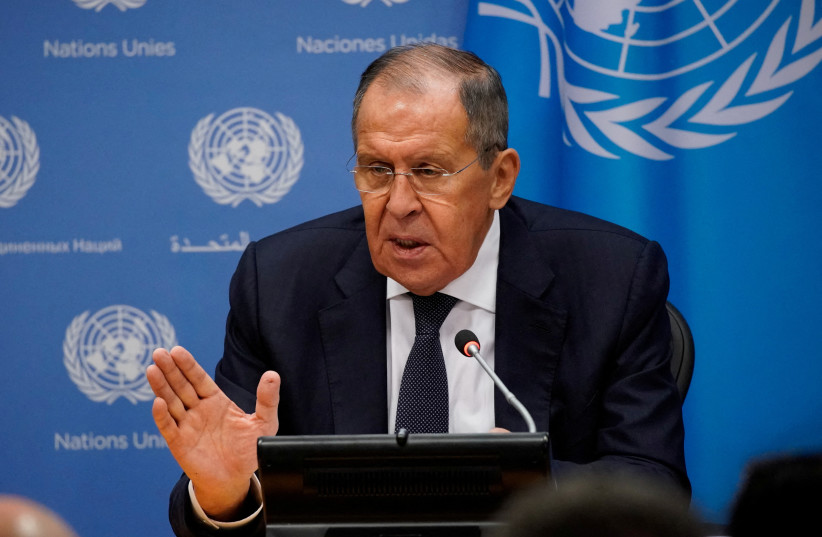Russian military technological assistance to Iran can be used against Israel, US Secretary of State Antony Blinken said on Capitol Hill on Tuesday, as he stressed the link between the Ukrainian and Gaza wars, particularly as it relates to American interests.
Blinken said he was concerned by “the assistance that Iran is providing to Russia for use in Ukraine to further its aggression.”
At the same time, he said, “Increasingly, technology that Russia is providing to Iran to make its own inventory more sophisticated could and almost most certainly will be used against Israel or against us.”
This would happen “either directly or via Iranian proxies” in the Middle East, Blinken told the US Senate Committee on Appropriations.
He appeared before it together with US Secretary of Defense Lloyd Austin to argue in favor of US President Joe Biden’s massive aid package for Ukraine and Israel, which includes $14 billion to help the Jewish state in its war against Hamas.

As the hearing began, a line of anti-war protesters raised red-stained hands in the air. Capitol police later removed them from the room after they shouted slogans including, “Ceasefire now!” “Protect the children of Gaza!” and “Stop funding genocide.”
Blinken and Austin stood firm in their support of Israel, particularly in light of the larger regional threats and Hamas links to those who threaten the US.
This two-way Russian-Iranian relationship “is one of increasing concern to us and one that we have to be acting against resolutely in both theaters, they are closely linked,” Blinken said.
Tensions rise between Israel and Russia
Blinken and Austin testified as tensions continued to rise between Israel and Russia, which has in the past been one of the Jewish state’s more stable allies.
At a press briefing in Washington, National Security Council spokesman John Kirby also drew a link between the two conflicts, with the Biden administration supporting Kyiv in its battle against Moscow and Jerusalem in its campaign against Hamas.
The battles Ukraine and Israel are waging are serious and intertwined, he said. The push for funds for both Ukraine and Israel comes as the Biden administration remained focused on keeping the Gaza war from spilling over into a regional conflict.
Yesterday, Iranian Foreign Minister Hossein Amirabdollahian met with Hamas leader Ismail Haniyeh in Doha. Amirabdollahian said that the entire region would be impacted if the scope of the conflict expands.
Amiirabdollahian added this indicates a peak of global hatred towards the Zionist regime and its supporters, as well as the worldwide extent of the supporters of the Palestinian nation.
Kirby said in Washington that officials continue to speak with regional allies, to both prevent escalation and promote regional cooperation.
“We have key national security interests at stake here in the region and we will need to protect them,” he said. To those who want to escalate the conflict, Kirby said, “Be mindful of how seriously we take our national security interests.
US National Security Advisor Jake Sullivan on Monday met with Saudi Arabian Defense Minister Prince Khalid bin Salman Al Saud and confirmed American commitment to support the defense of US partners against threats from state and non-state actors, including those backed by Iran, the White House said.
The two men also affirmed the importance of deterring any expansion of the Israel-Hamas conflict, the White House said.
Biden was expected to speak late Tuesday with Jordan’s King Abdullah to discuss cooperation with regional partners.
Jordan, however, wants Patriot air defense systems from Washington due to its growing concern about being caught in the crossfire if the war in Gaza pulls in Iran and its well-armed regional militias on the kingdom’s borders.
Israel’s National Security Adviser, Tzahi Hanegbi, told reporters in Tel Aviv that the IDF was looking to ensure that its war with Hamas on the country’s southern border would not escalate into a two-front war if Hezbollah on its border with Lebanon were to join in further. Both Hamas and Hezbollah are Iranian proxy groups.
The IDF is taking a defensive stand now, he said, but is taking precautionary steps. “In the northern sector, the decision is to be prepared for all developments, to carry out a strong defense by a large-scale mobilization of reserves that are already deployed on the Lebanese border,” Hanegbi said.
This has included “the evacuation of civilians from the line of defense in order to ensure that their well-being is being safeguarded in the event of a head-on clash with Hezbollah, and attacking enemy networks in response to his provocations everywhere and without hesitation.”
But, he added, a war with Hezbollah is only a matter of time. The IDF will have to eliminate the threat from Hezbollah in the north, but only once it has ousted Hamas from Gaza, Hanegbi said.
“The day after Hamas... we will have to consider what we learned from this period with respect to Lebanon. What we learned will oblige us to act” against Hezbollah, Hanegbi said.
Israel’s enemies want to see it make the mistake of spreading itself too thin, Hanegbi said, explaining that Israel doesn’t want to fall into that trap.
Hanegbi said that conversations were already being held, including with the security establishment and the National Security Council, about what Gaza would look like once it is no longer controlled by Hamas.
“We will not stop… we cannot stop,” until Hamas is removed from Gaza, he said.
Reuters contributed to this report.
